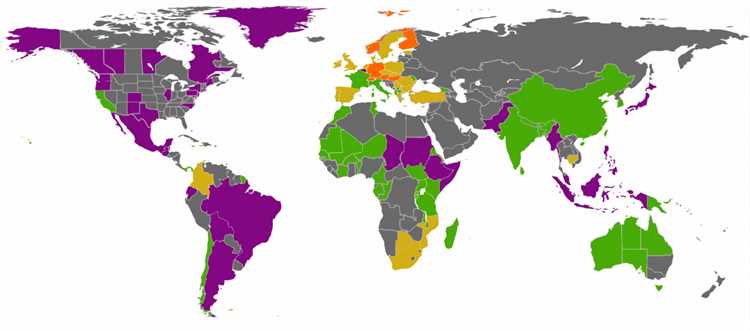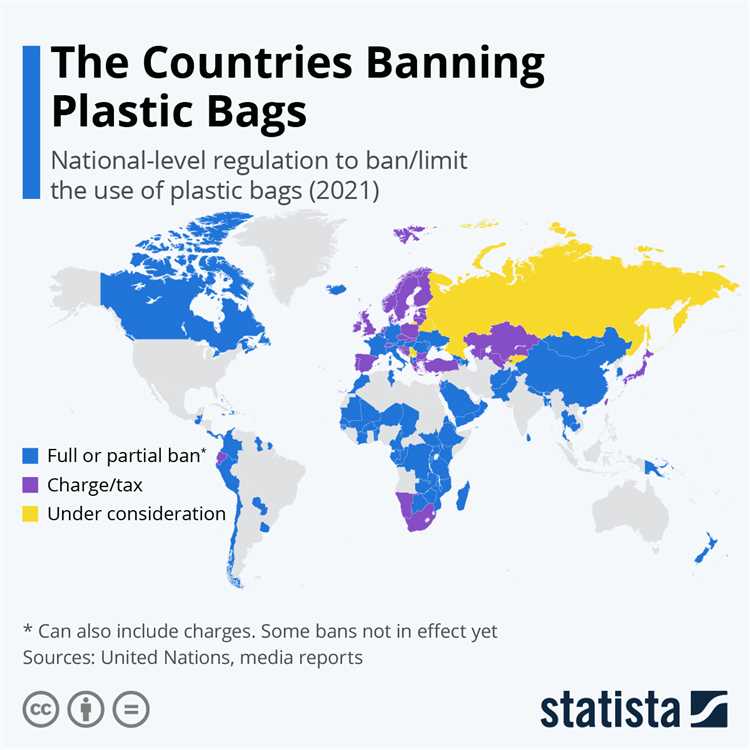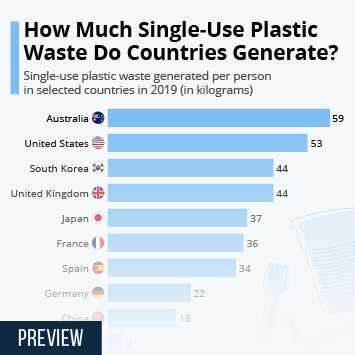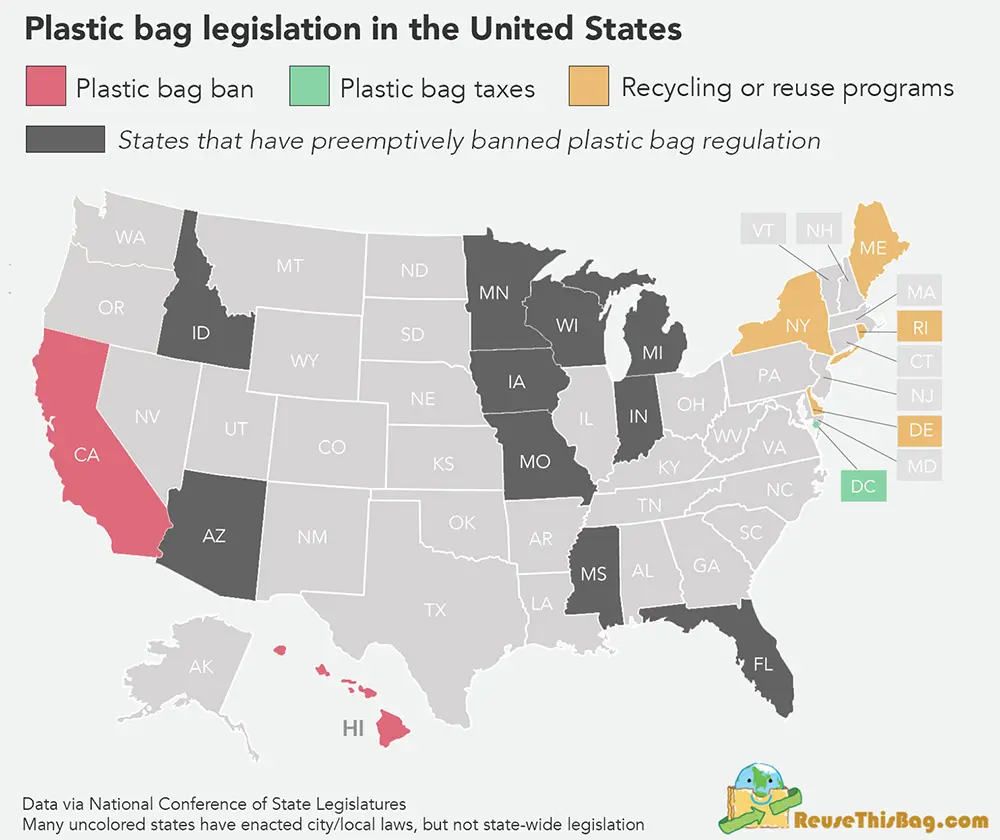Plastic pollution has become a global crisis, with devastating effects on our environment and wildlife. One of the main culprits is single-use plastic, which includes items like plastic bags, straws, and bottles that are used once and then thrown away. Fortunately, many countries around the world have recognized the urgency of tackling this issue and have taken action by imposing bans on single-use plastic.
So, how many countries have banned single-use plastic? The answer may surprise you. As of now, over 75 countries have implemented either partial or complete bans on single-use plastic items. These bans vary in their scope and severity, with some countries targeting specific items like plastic bags or straws, while others have imposed wider bans that include a range of single-use plastics.
There is a growing recognition that single-use plastic is not only harmful to the environment, but also to human health. The production and disposal of these items contribute to greenhouse gas emissions, pollute our oceans, and harm marine life. Additionally, microplastics, which are tiny particles of plastic that contaminate our food and water sources, have been found to have negative health impacts on humans, including potential links to cancer and reproductive issues.
- Learn about the global movement against single-use plastic
- Why is single-use plastic a problem?
- Efforts to ban single-use plastic
- Find out the number of countries that have taken action
- The leaders in banning single-use plastic
- The impact of these bans
- Discover the reasons behind the ban
- Explore the impact on the environment
- Q&A:
- How many countries have banned single-use plastic?
- Which countries were the first to ban single-use plastic?
- What are some examples of countries that have banned single-use plastic?
- Are there any penalties for using single-use plastic in countries with bans?
- What has been the impact of these bans on single-use plastic?
- How many countries have banned single-use plastic?
- Which countries have implemented the strictest bans on single-use plastic?
Learn about the global movement against single-use plastic
Single-use plastic has become a major environmental concern around the world. Many countries are taking action to combat this issue and reduce the amount of plastic waste that ends up in landfills and oceans. The global movement against single-use plastic aims to raise awareness about the detrimental effects of these products and encourage governments, businesses, and individuals to find sustainable alternatives.
Why is single-use plastic a problem?
Single-use plastic refers to products that are designed to be used only once before being thrown away. Examples include plastic bags, straws, water bottles, and packaging materials. These items contribute to pollution and harm ecosystems and wildlife. Plastic can take hundreds of years to break down, and in the meantime, it can leach harmful chemicals into the environment.
Efforts to ban single-use plastic
Many countries around the world have recognized the need to address the issue of single-use plastic and have implemented various bans and restrictions. Some countries have implemented outright bans on specific items, such as plastic bags or straws, while others have introduced taxes or charges on single-use plastic products to discourage their use.
| Country | Items banned | Date implemented |
|---|---|---|
| Kenya | Plastic bags | 2017 |
| India | Plastic bags, cups, plates, and straws | 2022 |
| Canada | Plastic bags, straws, and cutlery | 2021 |
| Australia | Plastic bags | 2019 |
| United Kingdom | Plastic straws, stirrers, and cotton buds | 2020 |
These are just a few examples of the countries that have taken steps to ban or restrict single-use plastic. This global movement is gaining momentum as more and more people recognize the need to protect the environment and reduce plastic waste.
In addition to government action, many businesses and individuals are also joining the fight against single-use plastic. Companies are adopting sustainable packaging alternatives, and individuals are making conscious choices to use reusable products and reduce their plastic consumption.
By learning about the global movement against single-use plastic, you can become more informed about the issue and contribute to the ongoing efforts to create a more sustainable future.
Find out the number of countries that have taken action

Many countries around the world have recognized the dire consequences of single-use plastic on our environment and have taken action to ban or restrict its usage. From imposing charges on plastic bags to implementing outright bans on certain plastic products, governments are acknowledging the need for sustainable alternatives.
As of the latest data available, there are over 60 countries that have implemented significant measures to reduce or eliminate single-use plastic. These countries have recognized the environmental damage caused by plastic pollution and are actively working towards a more sustainable future.
The leaders in banning single-use plastic

Some of the nations that have taken a pioneering role in the fight against single-use plastic include:
- Kenya: In 2017, Kenya imposed one of the world’s toughest bans on plastic bags, with penalties including fines and imprisonment for both manufacturers and users.
- Rwanda: Since 2008, Rwanda has banned the use of plastic bags, resulting in a substantial reduction in plastic pollution across the country.
- India: In 2016, India implemented a nationwide ban on disposable plastic items such as bags, cups, and cutlery in an effort to tackle its rapidly growing plastic waste problem.
- Canada: In 2021, Canada announced plans to ban single-use plastics, targeting items such as plastic bags, straws, and cutlery.
The impact of these bans

These countries’ efforts in banning single-use plastic have had a significant impact on reducing plastic waste and raising awareness about the importance of sustainability. By implementing these measures, they have set a powerful example for other nations to follow.
It is worth noting that while these countries have taken impressive action, the fight against single-use plastic is a global challenge that requires a collective effort. The number of countries taking action is growing, and it is essential for more nations to join the movement towards a plastic-free future.
Discover the reasons behind the ban
Environmental concerns:
The primary reason behind the ban on single-use plastic is the detrimental impact it has on the environment. Plastic pollution is a significant problem globally, with millions of tons of plastic waste ending up in oceans, rivers, and landfills every year. This pollution poses a severe threat to marine life, birds, animals, and the overall ecosystems.
Health hazards:
Another critical factor driving the ban on single-use plastic is the potential health hazards associated with it. Plastic items commonly used in food and beverage packaging contain harmful chemicals such as BPA and phthalates, which can leach into the products and pose health risks when consumed. These chemicals have been linked to various health issues, including hormone disruption, developmental problems, and certain cancers.
Resource depletion:
Plastic production relies heavily on fossil fuels, such as crude oil and natural gas. The extraction and processing of these non-renewable resources contribute to carbon emissions and depletion of finite resources. By banning single-use plastic, countries aim to reduce their reliance on fossil fuels and promote more sustainable alternatives.
Waste management challenges:
Single-use plastic presents significant challenges in terms of waste management. Unlike biodegradable materials, plastics can take hundreds of years to decompose naturally. The accumulation of plastic waste in landfills and natural environments is a burden on waste management systems worldwide. Banning single-use plastic encourages the adoption of alternatives that are easier to recycle or decompose, reducing the strain on waste management infrastructure.
Promoting a circular economy:
Implementing a ban on single-use plastic aligns with the goals of transitioning towards a circular economy. A circular economy aims to minimize waste, promote recycling, and emphasize resource efficiency. By banning single-use plastic, countries encourage businesses and consumers to adopt more sustainable practices and promote the use of reusable products and packaging.
Explore the impact on the environment

Single-use plastic is one of the major contributors to environmental degradation. The production and disposal of single-use plastic items have several adverse effects on the environment:
- Pollution of land and water: When single-use plastic is improperly disposed of, it finds its way into landfills, rivers, and oceans. This pollution harms terrestrial and aquatic ecosystems, leading to the death of many animals and marine life.
- Microplastic contamination: Single-use plastic items like bottles, bags, and straws eventually break down into smaller pieces called microplastics. These microplastics are ingested by marine life and can make their way up the food chain, potentially ending up in the human body.
- Greenhouse gas emissions: The production of single-use plastic involves the extraction and processing of fossil fuels, releasing greenhouse gases that contribute to climate change. Additionally, plastic decomposition in landfills also emits greenhouse gases, further exacerbating the problem.
- Resource depletion: Single-use plastic is made from non-renewable resources like crude oil and natural gas. The extraction of these resources leads to habitat destruction and biodiversity loss.
- Visual pollution: Plastic waste tends to accumulate in natural landscapes, such as beaches and forests, spoiling their beauty and negatively impacting tourism and local economies.
To mitigate these harmful impacts, many countries around the world have implemented bans on single-use plastic items. By reducing the production and consumption of these items, countries can work towards a more sustainable future and protect the environment for generations to come.
Q&A:
How many countries have banned single-use plastic?
As of now, 127 countries have implemented some form of ban or restriction on single-use plastic. These bans vary in scope and severity, with some countries completely prohibiting certain items like plastic bags, straws, or cutlery, while others have imposed taxes or levies on their use.
Which countries were the first to ban single-use plastic?
The first country to ban single-use plastic bags was Bangladesh in 2002. Since then, many other countries have followed suit, including Rwanda, which implemented a total ban on plastic bags in 2008. Other countries like China, India, and France have also implemented bans on single-use plastic items in recent years.
What are some examples of countries that have banned single-use plastic?
Some of the countries that have banned or restricted single-use plastic include Canada, Kenya, New Zealand, Costa Rica, Chile, and the United Kingdom. These countries have taken various measures to reduce plastic waste, such as banning plastic bags, straws, and other disposable items, and promoting the use of reusable alternatives.
Are there any penalties for using single-use plastic in countries with bans?
Yes, many countries that have implemented bans on single-use plastic have also enforced penalties for non-compliance. These penalties can include fines, confiscation of prohibited items, or even imprisonment in extreme cases. However, the severity of the penalties varies from country to country.
What has been the impact of these bans on single-use plastic?
The bans on single-use plastic have had a significant impact on reducing plastic waste and promoting sustainable alternatives. In countries where these bans have been implemented, there has been a noticeable decline in the consumption of single-use plastic items and an increase in the adoption of reusable alternatives. However, the effectiveness of these bans depends on factors such as enforcement, public awareness, and the availability of affordable alternatives.
How many countries have banned single-use plastic?
As of now, more than 120 countries have implemented some form of ban on single-use plastic. These bans vary in scope and severity, with some countries implementing full bans on all single-use plastic items, while others have restricted the use of certain types of plastic, such as bags and straws.
Which countries have implemented the strictest bans on single-use plastic?
Several countries have implemented strict bans on single-use plastic in order to reduce waste and protect the environment. Some of the countries with the strictest bans include Rwanda, which banned plastic bags completely, and New Zealand, which plans to phase out all single-use plastic items by 2025. Other countries, such as France and Costa Rica, have also implemented comprehensive bans on single-use plastics.